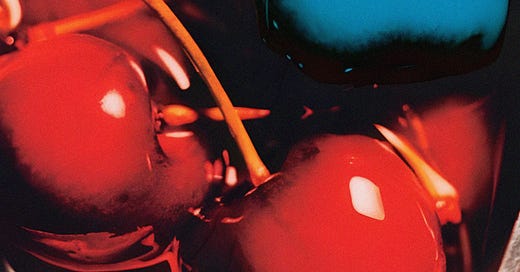Mixmag: Looking back at the sounds of ‘90s and early 2000s house, 2-step/garage and broken beat in Aotearoa
As above, so below.
Selected Works is a weekly (usually) newsletter by the Te Whanganui-a-Tara, Aotearoa (Wellington, New Zealand) based freelance music journalist, broadcaster, copywriter and sometimes DJ Martyn Pepperell, aka Yours Truly. Most weeks, Selected Works consists of a recap of what I’ve been doing lately and some of what I’ve been listening to and reading, paired with film photographs I’ve taken + some bonuses. All of that said, sometimes, it takes completely different forms.
In 1988, a coalition of busy music industry figures based in Tāmaki Makaurau/Auckland came together at the producer Alan Jansson’s Module 8 Studios. Over several evenings, they recorded what was arguably Aotearoa/New Zealand’s first house track. A self-titled, one-off studio project, ‘Jam This Record’ was marketed and released as an obscure white label. Spare and stripped down but oddly sample-heavy, the track’s unmistakably late-‘80s machine beat sound captivated discerning club DJs around the country and further abroad in the Northern Hemisphere, where it spent an unexpected but thrilling two weeks in the UK club chart.
As the final decade of the 20th century dawned, house music, be it of the Chicago, Acid, New York or UK varieties, was becoming a central part of the soundtrack of nightlife across Aotearoa. Amidst this seachange, Jansson teamed up with the then-emerging Tāmaki Makaurau hip-house group Chain Gang to record two aspirational singles for Epic Records, ‘Break The Beat’ (1990) and ‘Jump’ (1991). Accompanied by elaborate music videos, both tracks entered the Top 40 pop charts. Dance music wasn’t a fad. It was here to stay.
By the early-to-mid ‘90s, Tāmaki Makaurau was amid a Polynesian cultural renaissance which helped reshape the look, sound and feel of arts, culture, fashion and music in the city of sails, dance music included. Two local tracks from the era that skew towards the breakbeat end of the house spectrum include Anthony Ioasa’s ‘Baby You Know (Pacific Round House Remix)’ from the Deep In The Pacific Of Bass compilation (1993) and Fuemana’s ‘Fa A Samoa (Coconut Mix)’ off their New Urban Polynesian album (1994). It’s also worth noting that the CD single of the New Zealand pop group OMC’s global hit ‘How Bizarre’ included a sturdy dance mix.
Over the second half of the decade, live house bands like Tāmaki Makaurau’s Mesh and Te Whanganui-a-Tara/Wellington’s Ebb began to show up within the country’s burgeoning countercultural nightlife circuits. Weirdly though, recordings seem to fall away for a spell. That all shifted in 1999, when NZ house productions started popping up on CD compilation albums masterminded by the Tāmaki Makaurau collective/label Kog Transmissions. That same year, Simon Flower, aka Peak:Shift launched his house-focused Nurture Recordings sub-label, South Exit.
The tide rose in the early 2000s as a wave of promoters, nightclubs, dance-inclined musicians, DJs, producers, independent labels, sympathetic media outlets and radio stations, and some savvy major label A&Rs helped usher in a golden moment for the local scene. Much of this era was buoyed by a flurry of excellent commercially released mix CDs and their scrappier bootleg cousins. There’s also the matter of the influential American and British producer/DJs Matthew “Recloose” Chicoine and Dick Johnson aka Magik J both relocating to Aotearoa in 2001. Thirteen years later, Chicoine returned to the US. On the other hand, Johnson continues to live here. Regardless, they generously shared their skill sets and perspectives with the local music community.
Recently, I recorded a specialist DJ mix of ‘90s/2000s NZ house music for Mouthfull Radio. Looking back with two and a half decades of hindsight, it became salient that the genre’s early aughts boom coincided with a small wave of locally produced broken beat and 2-step/garage records. Given those genres' natural relationship with house music, it felt fitting to play and discuss these beautiful obscurities—some of which hide in plain sight—within the broader context of house music in Aotearoa. Now that we’ve got all that out of the way, here’s a list of ten house, broken beat and garage/2-step tracks and remixes released by New Zealand producers during the first half of the aughts.
You can read the full article here.
GOOD COUNTRY:
Te Reo Māori Homecoming: Language and home are a vast musical universe on Marlon Williams’ 'Te Whare Tīwekaweka.'
Thanks to Good Country for republishing my interview with the Māori New Zealand singer-songwriter and entertainer Marlon Williams for The Bluegrass Situation. If you haven’t checked it out, you can read it below.
To support the Q&A, The Bluegrass Situation/Good Country also had me write a supplementary article called “Exploring Home: Go deeper into Marlon Williams’ stunning new Māori-language album.” You can read it below.
FIN.





